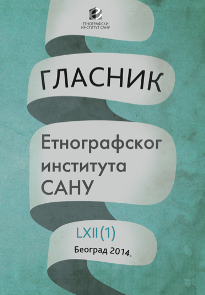Како је Словенија добила антибурек систем. Прилог историји семантичке продукције бурека
How Slovenia Got the Anti-Burek System. The History of the Burek and its Semantic Production
Author(s): Jernej MlekužSubject(s): Anthropology
Published by: Етнографски институт САНУ
Keywords: material culture; signification; nationalism; burek; Slovenia
Summary/Abstract: In modern Slovenian popular culture, media, vernacular etc., the burek – an important and popular dish among numerous immigrants to Slovenia and their descendants, and also probably the most popular Slovenian fast food – is probably the handiest and most often used signifier for immigrants from the former republics of the SFRY, the Balkans, the SFRY and the phenomena associated with it. The paper attempts to describe why and how this conceptual hyperinflation occurred precisely to this folded or rolled nutritional superhero, which most likely arrived in Slovenia in the early 1960s. The beginnings of the layering of all these meanings go back to the eighties, when the burek finally started to become a part of certain foreign urban food practices particularly among young people, which at the time were not seen as particularly meaningful. However, the fact that the burek found itself in the hands of "non-immigrants" was disturbing to some: the burek became a target of nationalism, which to some extent encouraged numerous young people during the nineties to appropriate it and to associate it with alternative or oppositional political meanings. But even in this case it would be insufficient or wrong to understand the burek as merely a symbolic object, chosen by college students and other young people during the nineties solely for its symbolic value – for its close but controversial association with Slovene nationalism. First we have to ask ourselves what was available during those times – cheap, accessible and providing at least a modicum of choices. The paper mirrors modern studies of material culture which assert the idea that materiality is an integral part of culture and society, and that without materiality, culture and society cannot be fully understood. The meanings of objects, and thus the meaning of the burek, are not understood (merely) as products of discourses and practices of signification, but (also) as embedded in the objective, material field in numerous and complex ways.
Journal: Гласник Етнографског института САНУ
- Issue Year: LXII/2014
- Issue No: 1
- Page Range: 113-129
- Page Count: 17
- Language: Serbian

